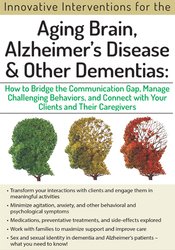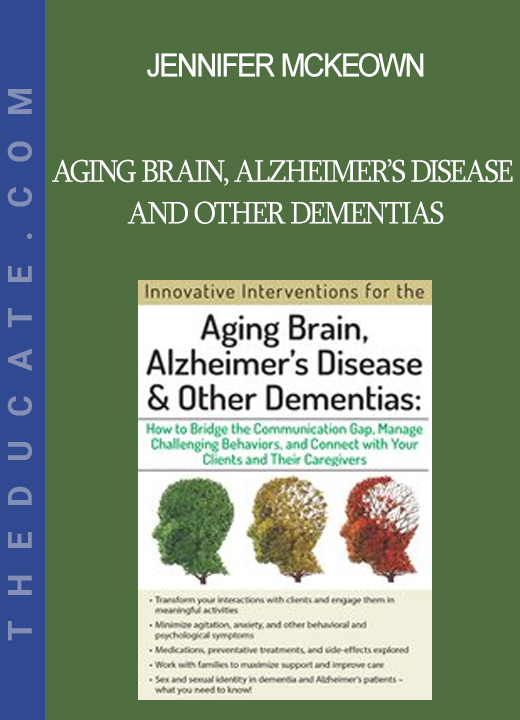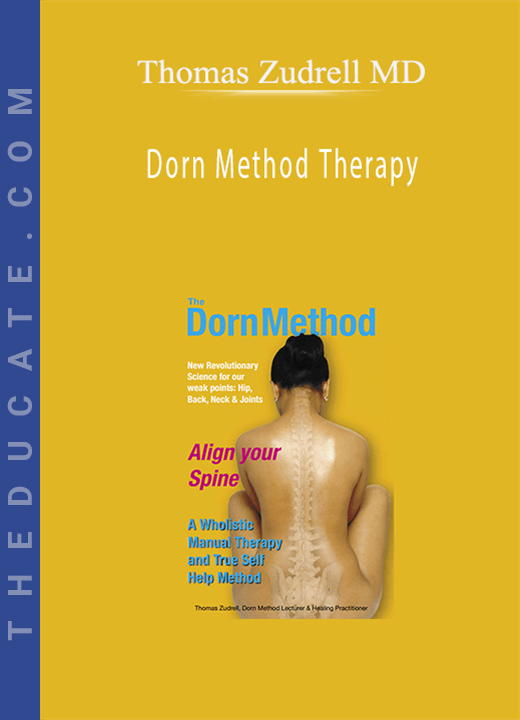Description

-
Jennifer McKeown – Aging Brain, Alzheimer’s Disease and Other Dementias: Bridge the Communication Gap, Manage Challenging Behaviors and Connect with Your Clients and Their Caregivers
- Faculty:
- Jennifer McKeown
- Duration:
- 5 Hours 50 Minutes
- Format:
- Audio and Video
- Copyright:
- Apr 19, 2018
Description
- Transform your interactions with clients and engage them in meaningful activities
- Minimize agitation, anxiety, and other behavioral and psychological symptoms
- Medications, preventative treatments, and side-effects explored
- Work with families to maximize support and improve care
- Sex and sexual identity in dementia and Alzheimer’s patients – what you need to know!
The challenges and frustrations of working with people suffering with dementia can feel overwhelming. You worry because your clients’ needs aren’t clearly communicated and you need a better way to reach them. Difficult behavioral issues like agitation and anxiety often get in the way of your ability to provide care. Interventions and techniques that worked yesterday, don’t work today. And you even need to work with patients and their spouses regarding uncomfortable personal issues like sex and sexuality that they didn’t teach you about at school.
As a Licensed Mental Health Counselor and Director of Social Work for a skilled nursing facility, Jennifer McKeown has spent the last decade immersed in the Alzheimer’s and dementia field. Through her work with hundreds of dementia sufferers and their families, she has acquired the hands-on skills, techniques, and solutions you need to handle the challenges, answer your questions, and provide the best care possible.
Join Jennifer as she walks you through what works and what doesn’t with geriatric patients facing Alzheimer’s disease and other dementias. Return to your practice better able to evaluate, assess and effectively intervene in depression, anxiety, aggression and other behavioral and psychological symptoms of dementia. Broaden your understanding of medications, preventative treatments, and the impact of their side-effects on older patients. Walk away with innovative tools to overcome communication deficiencies and a game plan for maximizing client support in partnership with caregivers and family members.
Practical and understandable, Jennifer’s animated and interactive delivery style will draw you into the dire nature of dementia and leave you feeling empowered and eager to use your new skills!
Don’t wait, sign up for this multifaceted seminar today!
Key benefits of attending:
- Communication tools to transform your interactions with clients and engage them in meaningful activities.
- Sidestep problem behaviors – identify and understand triggers for delusions, hallucinations, and anxiety.
- Up-to-date behavioral interventions to manage agitation and elopement, reduce risks, and allow you to adapt treatment as the disease changes.
- Learn how to handle sex and sexual identity in dementia with confidence and sensitivity.
- Tips and tactics for working in partnership with families to improve care.
Handouts
| Manual (3.42 MB) | 98 Pages | Available after Purchase |
Outline
- Diagnosis, Prognosis and Pharmacological Treatment
- Types of dementia and pseudo-dementia
- Alzheimer’s disease
- Diagnosis and prognosis
- Stages/Presentation
- Risk factors/Genetics
- Assessment tools
- Medications and side-effects explored
- Current medications
- Preventative treatments
- Bridge the Communication Gap with Innovative Approaches
- When traditional communication is replaced by behaviors
- Person centered: Gathering beliefs and values
- Effective tips for communicating with dementia patients
- Find the meaning behind the gesture
- How to avoid arguments
- What questions to ask, and how to ask them
- Meaningful activities that connect
- Music and memory
- Photo books, boxes
- Postcards and other innovative tools
- Behavioral and Psychological Symptoms: Triggers and Intervention Techniques
- Depression and anxiety
- Journaling
- Music and memory
- Aromatherapies
- Agitation – triggers, pain and care planning
- Music
- Aromatherapies
- Bright Light therapy
- Delusions and hallucinations
- Potential causes and complications
- Wandering as a stress reliever
- Elopement -reducing risks and action steps
- Adapting as the disease changes
- Depression and anxiety
- Work with Caregivers: Family as Members of the Care Team
- Family dynamics
- Normalizing change
- Validation, empathy and active listening
- Providing 1:1 counseling to families
- Anticipatory grief counseling
- Caregiver self-assessment scale
- Caregiver burnout and where to go for help
- Sex, Intimacy and Sexual Identity in Dementia and Alzheimer’s Disease
- Sexual manifestation and expression
- Dementia and marital sex
- Assessment tools for ability to consent
- Sexual expressiveness and interventions for dignity
- LGBTQ Culture
- Needs and competencies
- SAGE: Advocacy & Services for LGBTQ Elders
- The Ethics of Dementia
- End of life issues
- Power of Attorney
- Elder abuse
Faculty
Jennifer McKeown, LMHC, CDP, CADDCT Related seminars and products: 1
Jennifer McKeown, LMHC, CDP, CADDCT is a Licensed Mental Health Counselor, Certified Dementia Practitioner and Alzheimer’s Disease and Dementia Care Trainer, who has seen hundreds of patients and their families through the process of dementia and Alzheimer’s disease. She found her true calling while working as a hospital social worker and a director of social work for a nursing home. Jennifer has immersed herself in the field over the last decade and serves as the director of social work for a skilled nursing facility focusing on psychosocial support and family education. Jennifer is also an adjunct professor for a community college providing professional courses on dementia to service providers as well as nursing and social work students.
Speaker Disclosures:
Financial: Jennifer McKeown is director of social work at Bethany Village. She is an adjunct professor for Corning Community College. Ms. McKeown receives a speaking honorarium from PESI, Inc.
Non-financial: Jennifer McKeown is a member of the American Mental Health Counseling Association.






Reviews
There are no reviews yet.